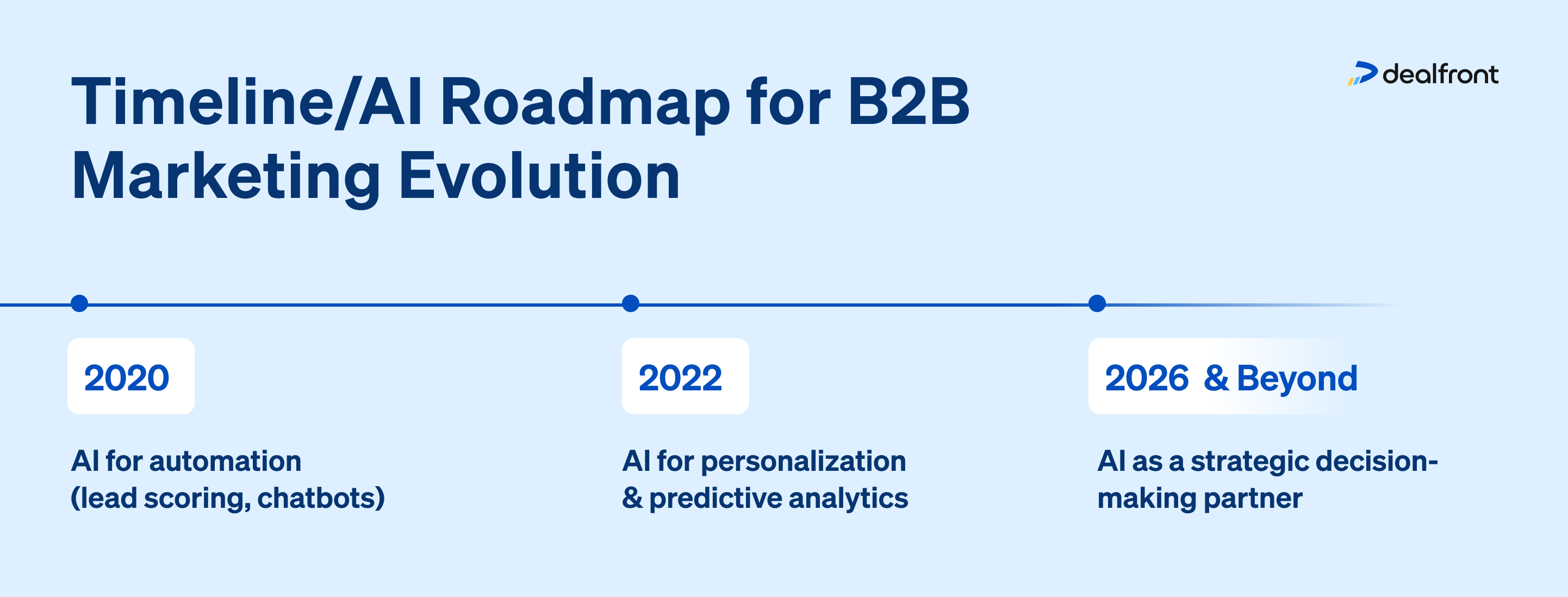The Future of B2B: Utilizing AI Automation to Drive Success
The landscape of B2B is moving as firms progressively turn to AI automation for strategic advantage. This change guarantees to boost efficiency and customer engagement through advanced innovations. The assimilation of these devices is not without its obstacles. Understanding just how businesses can navigate this developing terrain will be essential for future success. What aspects will identify the performance of AI in this industry? The answers might redefine standard service models.
Understanding AI Automation in B2B
As organizations increasingly seek effectiveness, comprehending AI automation in B2B becomes vital. AI automation describes the usage of expert system modern technologies to improve and improve business processes. In the B2B market, this entails the integration of AI devices to take care of tasks such as data evaluation, customer communications, and supply chain operations. By leveraging equipment learning and natural language processing, firms can improve accuracy, reduce human error, and speed up decision-making (Minarik AI). Moreover, AI automation assists in the handling of large volumes of data, making it possible for companies to draw out beneficial insights and optimize their operations. As organizations browse this technological landscape, an extensive understanding of AI automation's capacities will equip them to remain competitive and receptive to market needs
Secret Benefits of AI Automation for Companies
While numerous organizations come to grips with boosting functional demands, AI automation offers countless advantages that can markedly improve their performance. One considerable advantage is performance; AI systems can carry out repeated jobs quicker and with better precision than humans, thereby minimizing errors and freeing up workers for more critical initiatives. In addition, AI automation allows data-driven decision-making by examining vast datasets swiftly, supplying understandings that educate service approaches. Expense reduction is one more essential benefit, as automation lessens labor expenses and optimizes source allowance. AI can improve scalability, permitting services to adjust to market modifications promptly. Eventually, the assimilation of AI automation promotes technology, enabling companies to stay affordable in a swiftly progressing landscape.
Changing Consumer Experiences With AI
AI is reshaping client experiences by allowing tailored interactions and boosting engagement. Via the implementation of predictive analytics, organizations can anticipate customer requirements and preferences, leading to more tailored services. Furthermore, streamlining support procedures with AI innovation enhances efficiency and fulfillment, inevitably transforming the general customer trip.
Personalized Interactions and Engagement
Individualized communications have ended up being a cornerstone of efficient consumer interaction in the B2B landscape. By leveraging AI-driven solutions, companies can customize their interaction and offerings to meet the unique demands of each client. Automated systems evaluate consumer preferences, data, and habits, enabling organizations to create personalized experiences that resonate with their target market. This level of customization not only enhances consumer satisfaction however likewise promotes lasting loyalty. Furthermore, AI tools help with real-time interactions, enabling businesses to react promptly and successfully to questions and comments. As an outcome, business can construct stronger partnerships with customers, ensuring that their services straighten with advancing expectations. Ultimately, individualized interaction with AI brings about improved end results and sustained success in the affordable B2B market.
Predictive Analytics Application
As organizations significantly look for to boost client experiences, applying predictive analytics has actually emerged as a pivotal strategy in the B2B sector. By leveraging data-driven insights, organizations can anticipate customer needs and choices, allowing them to customize their offerings better. Predictive analytics uses historical information and innovative formulas to anticipate future habits, permitting services to identify potential challenges and opportunities. This proactive method not only enhances consumer complete satisfaction yet also fosters loyalty by supplying relevant and timely services. Additionally, predictive analytics helps in resource allotment, making certain that advertising and marketing initiatives are focused on high-value prospects. Inevitably, the integration of predictive analytics equips B2B firms with the tools needed to change client interactions and drive long-term success in an increasingly competitive landscape.
Simplifying Support Procedures
Enhancing customer experiences in the B2B market extends past predictive analytics; enhancing assistance procedures plays a vital role. By incorporating AI-driven options, companies can automate routine inquiries and improve reaction times, leading to heightened client fulfillment. Chatbots and online aides give 24/7 assistance, resolving customer requires promptly and minimizing the burden on human representatives. This automation allows groups to concentrate on complex concerns, cultivating even more significant interactions. Moreover, AI devices can analyze assistance information to identify patterns and locations for enhancement, making certain continual enhancement of solution high quality. As organizations embrace these technologies, they place themselves as customer-centric and responsive, inevitably driving loyalty and service development in an increasingly affordable landscape.
Simplifying Workflow and Processes
Enhancing operations and processes in B2B settings is vital for enhancing overall efficiency. By maximizing workflow performance and automating regular tasks, companies can lower manual errors and liberate important sources. This change not just enhances efficiency yet also makes it possible for groups to concentrate on critical campaigns that drive growth.
Maximizing Operations Performance
Enhancing workflow performance is important for businesses seeking to decrease functional costs and improve performance. By examining existing procedures, organizations can identify bottlenecks and redundancies that hinder efficiency. Carrying out structured treatments boosts interaction and partnership amongst teams, making sure that tasks are finished extra quickly. Using data-driven insights makes it possible for firms to make enlightened decisions that refine operations additionally. Furthermore, embracing integrated modern technologies can promote seamless information circulation, decreasing the danger of errors and hold-ups. As services accept these adjustments, they not just promote a more dexterous job atmosphere yet additionally position themselves to react rapidly to market needs - Growth Systems For B2B. Eventually, concentrating on operations performance allows companies to assign resources efficiently, driving long-lasting success in a progressively competitive landscape
Automating Routine Jobs
Many companies are progressively turning to automation to handle regular tasks, identifying its potential to why not look here substantially improve functional effectiveness. By deploying AI-driven solutions, firms can streamline repeated activities such as information entry, billing handling, and customer questions. This change not just lowers human error yet also maximizes useful worker time, permitting team to concentrate on value-added tasks and tactical efforts. Furthermore, automation can enhance action times and solution uniformity, resulting in enhanced consumer satisfaction. As businesses navigate a competitive landscape, leveraging automation for regular jobs comes to be necessary for optimizing workflows and maintaining agility. Eventually, this strategy fosters advancement and drives growth, placing companies for lasting success in the evolving B2B environment.
Enhancing Decision-Making Through Information Insights

Overcoming Obstacles in AI Application
Although AI execution holds the assurance of substantial functional improvements, organizations frequently deal with a myriad of difficulties that can hinder development. Key obstacles consist of data quality problems, as many enterprises deal with insufficient or irregular datasets required for efficient AI training. Additionally, resistance to change within the labor force can impede the adoption of AI innovations, as employees might fear job displacement or lack the needed skills. Budget restraints likewise present an obstacle, limiting financial investment in the required infrastructure and talent. Integrating AI systems with existing procedures can be intricate, demanding significant time and sources. Getting rid of these obstacles requires a critical method that includes thorough training, modification monitoring, and a commitment to continuous enhancement in AI initiatives.
Future Patterns: The Next Frontier in B2B Automation
While the landscape of B2B automation proceeds to evolve, arising patterns are positioned to redefine just how organizations run. The assimilation of innovative fabricated intelligence will certainly facilitate a lot more individualized customer experiences, allowing businesses to customize solutions precisely to client demands. The surge of predictive analytics will certainly make it possible for companies to prepare for market shifts and maximize decision-making processes. Automation of regular jobs with robotic process automation (RPA) will boost efficiency, reducing functional prices substantially. Furthermore, the adoption of blockchain innovation promises improved transparency and security in transactions. As these advancements gain grip, business will increasingly utilize AI-driven insights to promote partnership, simplify supply chains, and boost total efficiency, marking a transformative change in the B2B landscape.
Regularly Asked Inquiries
What Kinds Of Companies Can Profit The Majority Of From AI Automation?
Production, logistics, and consumer service companies can profit most from AI automation. These fields boost functional performance, lower expenses, and boost consumer communications, inevitably leading to boosted performance and earnings in an open market.
Exactly How Can Tiny Businesses Execute AI Automation Successfully?
Small businesses can carry out AI automation successfully by identifying repeated jobs, picking easy to use devices, making sure appropriate training for staff members, and progressively integrating solutions to optimize workflows while checking efficiency and changing methods based on comments.
What Prevail False Impressions About AI in B2B?
Common misunderstandings concerning AI in B2B consist of the idea that it is only for large business, that it ensures immediate results, and that it can completely change human decision-making as opposed to augmenting it. AI Automation For B2B.
Exactly How Does AI Automation Effect Worker Duties and Work Protection?
AI automation improves worker duties by streamlining repeated tasks, cultivating effectiveness and innovation. While some fear task loss, it frequently produces opportunities for upskilling and new placements, eventually enhancing work safety through added worth and productivity.
What Abilities Are Required to Take Care Of AI Automation Projects?

As companies progressively seek efficiency, comprehending AI automation in B2B becomes vital. AI automation facilitates the handling of big quantities of data, enabling companies to extract valuable insights and maximize their procedures. While lots of companies grapple with increasing functional demands, AI automation offers countless advantages that can substantially improve their efficiency. Automation of regular tasks with robotic process automation (RPA) will certainly improve performance, lowering operational expenses considerably. Production, logistics, and client solution organizations can benefit most from AI automation.